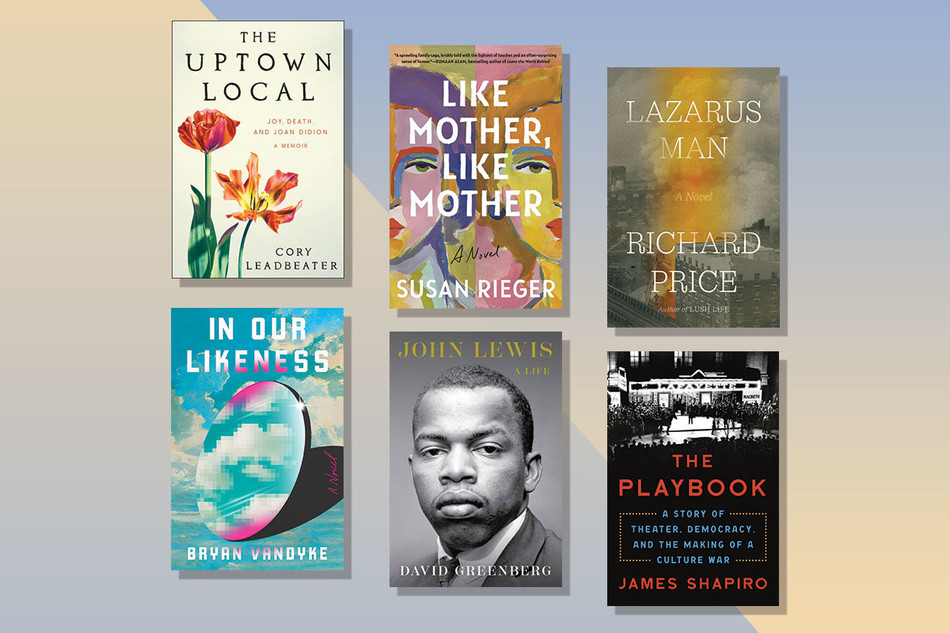The Uptown Local
By Cory Leadbeater ’14SOA
When Cory Leadbeater was an MFA student at Columbia, his mentor — poet James Fenton — e-mailed him about a job as a live-in personal assistant to a “well-known writer.” That writer was Joan Didion, and Leadbetter spent the last nine years of Didion’s life by her side, arranging meals, ordering her Kleenex, and reading Auden poems to her before bed. For Leadbetter, who grew up “lonely and lower-middle-class,” Didion’s posh Upper East Side world was foreign. But the two shared something profound: grief. As Didion mourned the loss of her husband and daughter, Leadbetter was reeling from his best friend’s death and his father’s incarceration. His beautiful memoir about their bond would doubtless have made her proud.
Like Mother, Like Mother
By Susan Rieger ’76LAW
On the surface, powerhouse journalist Lila Pereira really seems to have it all — the executive-editor job at the important Washington newspaper, beautiful children, and a hands-on husband who keeps it all together. But Lila’s youngest daughter, Grace, resents her mother’s demanding career. When Grace grows up, she writes a best-selling book about her pioneering mother, and in doing so uncovers dark secrets that help her see her family in a new light. In her third novel, Susan Rieger, a former Columbia associate provost, writes with humor and warmth about the unique bonds between three generations of strong women.
The Playbook
By James Shapiro ’77CC
The Federal Theatre Project, established during the Great Depression as a way to employ artists, writers, directors, and theater workers, was one of the New Deal’s most successful programs. Between 1935 and 1939, more than a thousand of its productions were seen by thirty million people. The group was ahead of its time in many ways. But this risk-taking also led to the program’s downfall, when a zealous anti-Communist congressman labeled it “un-American” and pulled funding. Columbia literature professor James Shapiro’s all-too-resonant new book examines the history of the brief but influential project and the precarious relationship between government and the arts.
In Our Likeness
By Bryan VanDyke ’00SOA
Graham Gooding is rising through the ranks at a tech startup when he is asked to test out a new algorithm designed to detect lies on the Internet. As he plays around with the program, Graham makes an edit in the online profile of his coworker, only to find that the change happens in real life. With the sudden power to alter reality, Graham has some dangerous choices to make, especially when his ambitious boss finds out about this new development. In his debut novel, former tech employee Bryan VanDyke captures the both intoxicating and terrifying possibilities of the AI age.
John Lewis: A Life
By David Greenberg ’01GSAS
For the better part of six decades, John Lewis ’97HON was known for making “good trouble” — first as a leader in the civil-rights movement and then as a member of Congress, where he served seventeen terms. Rutgers history professor David Greenberg’s new book is the first definitive biography of the monumentally accomplished politician. Drawing on interviews with Lewis and his friends and colleagues, along with archives, letters, never-before-seen FBI files, and even just-surfaced film from Lewis’s hospital bed after he was beaten by Alabama police on Bloody Sunday, Greenberg crafts a nuanced portrait of a man some called “the conscience of Congress.”
Lazarus Man
By Richard Price ’76SOA
Richard Price is famous for his vivid chronicles of life in urban America: his best-selling novel Clockers was made into a movie by Spike Lee, and Price counts The Wire and The Color of Money among his many screenwriting credits. In his latest novel, he turns to East Harlem, circa 2008. A five-story tenement has just collapsed, leaving six dead, several missing, and one miraculous survivor. Price moves seamlessly between different characters — the survivor, a city detective, a photographer, and a local funeral-home owner — creating a vibrant portrait of a community in crisis.



